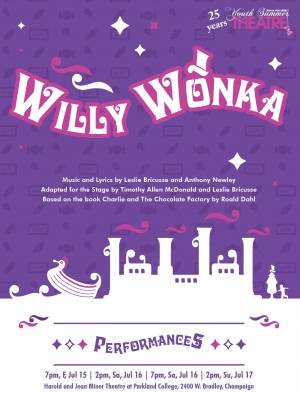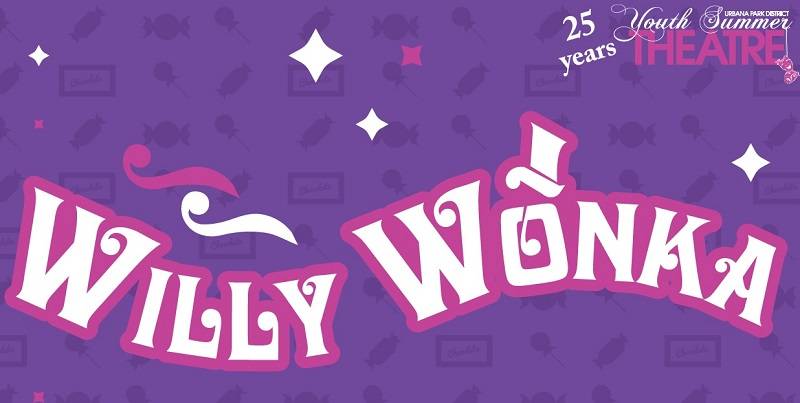Urbana Park District’s Youth Summer Theatre (UPDYST) is bringing a screen favorite to the stage with an adapted version of Roald Dahl’s beloved classic. This is the tale of the poor boy who wins a lifetime of chocolate when an aging impresario seeks a successor. You may have read the book, or seen either (or both) of the films, and have your own opinions about each, that’s fair. Director Katie Odom and some of the principal actors assure us, however, that this production offers favorite moments from each version (creepy boat!) as well as new perspectives.
 Katie Odom is stepping into her first major directing role after living a childhood that seemingly groomed her for this undertaking. Cast in her first UPDYST role at 5 years old, she acted through high school and worked her way through most tech positions during her time at Parkland before transferring to the University of Illinois for Theatre Studies. After performing Assistant Stage Manager and Assistant Director roles, and encouraged by both her mother and her former director, Jennifer Bechtel, Katie embraced the opportunity to direct this summer’s UPDYST production.
Katie Odom is stepping into her first major directing role after living a childhood that seemingly groomed her for this undertaking. Cast in her first UPDYST role at 5 years old, she acted through high school and worked her way through most tech positions during her time at Parkland before transferring to the University of Illinois for Theatre Studies. After performing Assistant Stage Manager and Assistant Director roles, and encouraged by both her mother and her former director, Jennifer Bechtel, Katie embraced the opportunity to direct this summer’s UPDYST production.
With so many different versions of Charlie and the Chocolate Factory out in the world, I was curious about what the stage production would present. Both she and a few cast members were happy to talk about it with me.
SP: Without giving too much away, can you tell us a little bit about the differences between the film and the play?
Katie Odom: I would say that this version of the play actually stays a bit truer to Roald Dahl’s book with some of the well known songs from the Gene Wilder film. You’ll hear the famous songs like “Cheer Up, Charlie,” “I”ve Got a Golden Ticket,” “Pure Imagination,” and many others, however, much of the script —at least act one— focuses primarily upon Charlie and his family. This was an interesting take on the story and is one that I definitely focused on while working with the cast. So without giving too much away, I’d say fans of the book and Gene Wilder film alike will enjoy the show as well as those who love the Tim Burton film.
SP: Have to ask: creepy steamboat scene, yes or no?
Odom: Haha, yes there will be the boat scene. You can’t very well do Willy Wonka without the candy boat, but I promise it won’t be as creepy as the Gene Wilder rendition.
SP: The character of Willy Wonka differs greatly between the book and each film. Can you tell me which direction Harris is taking the character, and why you guided him that way?
Odom: This script flows in much the same way as the book, making Wonka sound every bit as eccentric as possible. Josh has found Wonka to be a funny, eccentric, sarcastic, and crazy character, but he is still very much a man on a mission to find a successor. So as he is leading these possible successors through the factory, knowing each temptation will take them out of the running at any moment, Wonka becomes more visibly diminished as his future grows dim. It’s what has made Wonka such a complicated character for Josh, but has also been a hysterical one to watch.
—
 At this point, I talked to a few cast members to get their views on book vs. movie vs. play:
At this point, I talked to a few cast members to get their views on book vs. movie vs. play:
SP: Is there a difference between your character in the play and either movie? Which one do you prefer your character in?
Matt Christman (Grandpa Joe): There is a large difference between my character in the show vs my character in the Gene Wilder movie. I love the Grandpa Joe in the movie a lot more because he has a lot more presence in the movie and a lot more sass. My favorite part in the movie was when Veruca tells her father she wants a pink candy boat and Grandpa Joe mumbles to Charlie that she wants “a good kick in the pants.” I just feel like he had more of a character in the movie whereas it only makes sense to me to play grandpa as a confused old man and nothing more.
Andrew Stelzer (Mr. Salt): Mr. Salt in the show is actually closest to Mr. Beauregard from the movie. He’s a born businessman who keeps trying to sell his nuts to the reporters and Willy Wonka. Both Mr. Salts totally spoil their daughters, though I think I prefer the Mr. Salt in the show to the one in the movie because he’s a slightly more complicated character. Combining the movie personalities of Mr. Salt and Mr. Beauregard also allows for the role of Mrs. Beauregard, who is hilarious.
Jasmine Elam (Mrs. Gloop): Well, my character does have a song in the stage film, and she probably gets more attention than her son. In the movie, I feel like Augustus has more personality, but Mrs. Gloop is the one with all the personality in the stage adaptation.
SP: What’s your favorite aspect of your character?
Christman: The thing I love most about Grandpa Joe is his false sense of optimism. He’s brave and positive for Charlie so he doesn’t frighten him while he keeps a strong grip on the very real situation his family is in. It amplifies the feelings associated with inheriting Wonka’s Factory.
Stelzer: Mr. Salt is fun to play because he’s totally oblivious to other people’s opinions of him. Willy Wonka keeps making jokes to his face, and he never realizes until Veruca freaks out about it. It’s really fun to act confused.
Elam: Mrs. Gloop is huge, loud, and obnoxious, just like me. She’s always flaunting her personality, and I’m always having fun.
SP: Just for fun, if you were able to improv dialogue between the parent/child pairing you are part of, what would you say to your other half?
Christman: I would have Grandpa Joe tell Charlie that the world isn’t that bad. Life knocks us down from time to time but no matter what problems we get ourselves into, we must keep pressing on in life thinking positive.
Stelzer: I’d like to act out a full argument with Veruca. It would be interesting to react to her blowing up at me and trying to make her calm down.
Elam: I would probably tell Augustus that I love him, because he’s my whole world.
—
For a few final words, I turned back to the director, Katie Odom.
SP: I know UPD Youth Theatre makes a point of accepting all performers who audition, which is probably quite challenging for the director & crew. What do you feel is the benefit of this policy?
Odom: A lot of the actors who come into this program, especially the young ones, have no prior experience being on stage or even singing. So as artists and teachers, we are then able to give them the tools that they will carry with them the rest of their lives, even if they don’t pursue theater as they grow older, like public speaking. A lot of other theater companies won’t take the time or don’t feel the need to teach the basics and instead feel that their casts should come into the production already with that foundation. But what that does, is tell a young actor —perhaps the next star of Broadway— “you’re not good enough for my show,” which is pretty discouraging. We give each participant a fair shot and help them build on their strengths and weaknesses while giving them a safe place to express themselves and have fun.
SP: Is there anything else you’d like to say about the production?
Odom: I found it quite interesting that the playwright spent a great deal of time focusing on the Bucket family during act one, putting emphasis on the lifestyle of the family. This had me thinking from very early on on how to convey this to the cast – especially the Bucket family. While the family is not homeless, there are definitely things they go without; for instance, when listening to the radio is a luxury or when having fresh cabbage soup (the only thing they eat) is a “treat.” The actors were very good about understanding the situation of the Bucket family and were eager at times to know more. This had me thinking even more, and we are now doing a community outreach with the Daily Bread Soup Kitchen.
In the near future a few of the cast members will go and hopefully sing for the Daily Bread before they begin serving one day and we will also be giving audience members the opportunity to make donations when they come see the production. It’s very exciting for all of us and made my heart feel completely full when I saw how eager and excited the Daily Bread was to partner with us and how excited the kids were in return. I believe it’ll make for an incredible opportunity for all!
—
UPDYST’s Willy Wonka opens tomorrow, Friday, july 15th for only one weekend. Friday and Saturday have 7 p.m. showings and 2 p.m matinees will be held on Saturday and Sunday. Ticket prices for all showtimes are $14 for adults, $10 for senior/student, and $7 for youth under 12. Purchase tickets online, by calling (217) 367-1544 ext. 0, or at the door beginning one hour before showtime.
About the author…
As Arts Editor for Smile Politely, rknaur finds herself doing a lot of heavy lifting over the summer. If you think the section is getting a little one-note, feel free to email her about writing for Arts. Otherwise, she is super-impressed by all the altruism among youth actors these days, rite?









 About the author…
About the author…